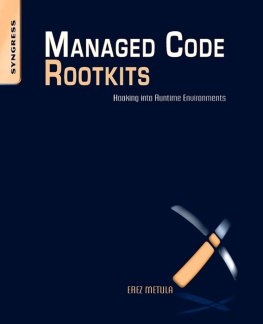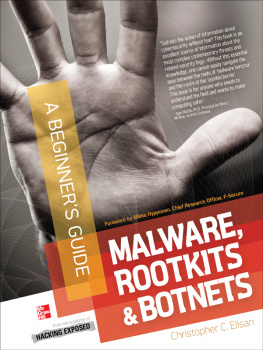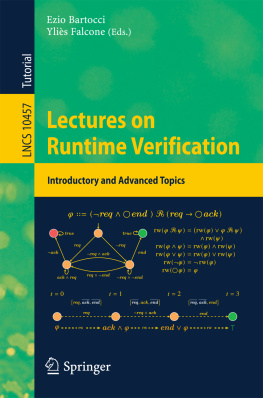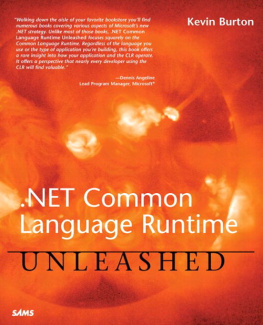Metula - Managed Code Rootkits: Hooking into Runtime Environments
Here you can read online Metula - Managed Code Rootkits: Hooking into Runtime Environments full text of the book (entire story) in english for free. Download pdf and epub, get meaning, cover and reviews about this ebook. City: Saint Louis, year: 2014, publisher: Elsevier Science, genre: Computer. Description of the work, (preface) as well as reviews are available. Best literature library LitArk.com created for fans of good reading and offers a wide selection of genres:
Romance novel
Science fiction
Adventure
Detective
Science
History
Home and family
Prose
Art
Politics
Computer
Non-fiction
Religion
Business
Children
Humor
Choose a favorite category and find really read worthwhile books. Enjoy immersion in the world of imagination, feel the emotions of the characters or learn something new for yourself, make an fascinating discovery.
Managed Code Rootkits: Hooking into Runtime Environments: summary, description and annotation
We offer to read an annotation, description, summary or preface (depends on what the author of the book "Managed Code Rootkits: Hooking into Runtime Environments" wrote himself). If you haven't found the necessary information about the book — write in the comments, we will try to find it.
Endnote -- Part IV: Where Do We Go from Here? -- Chapter 10. Other Uses of Runtime Modification -- Runtime Modification As an Alternative Problem-Solving Approach -- Runtime Hardening -- Summary -- Index.
Managed Code Rootkits is the first book to cover application-level rootkits and other types of malware inside the application VM, which runs a platform-independent programming environment for processes. The book, divided into four parts, points out high-level attacks, which are developed in intermediate language. The initial part of the book offers an overview of managed code rootkits. It explores environment models of managed code and the relationship of managed code to rootkits by studying how they use application VMs. It also discusses attackers of managed code rootkits and various attack scenarios. The second part of the book covers the development of managed code rootkits, starting with the tools used in producing managed code rootkits through their deployment. The next part focuses on countermeasures that can possibly be used against managed code rootkits, including technical solutions, prevention, detection, and response tactics. The book concludes by presenting techniques that are somehow similar to managed code rootkits, which can be used in solving problems. Named a 2011 Best Hacking and Pen Testing Book by InfoSec ReviewsIntroduces the reader briefly to managed code environments and rootkits in generalCompletely details a new type of rootkit hiding in the application level and demonstrates how a hacker can change language runtime implementationFocuses on managed code including Java, .NET, Android Dalvik and reviews malware development scanarios. Read more...
Abstract: Endnote -- Chapter 7. Automated Framework Modification -- What is ReFrameworker? -- ReFrameworker Modules Concept -- Using the Tool -- Developing New Modules -- Setting Up the Tool -- Summary -- Chapter 8. Advanced Topics -- Object-Oriented-Aware Malware -- Thread Injection -- State Manipulation -- Covering the Traces As Native Code -- Summary -- Part III: Countermeasures -- Chapter 9. Defending against MCRs -- What Can We Do about This Kind of Threat? -- Awareness: Malware Is Everybodys Problem -- The Prevention Approach -- The Detection Approach -- The Response Approach.
Endnote -- Part IV: Where Do We Go from Here? -- Chapter 10. Other Uses of Runtime Modification -- Runtime Modification As an Alternative Problem-Solving Approach -- Runtime Hardening -- Summary -- Index.
Managed Code Rootkits is the first book to cover application-level rootkits and other types of malware inside the application VM, which runs a platform-independent programming environment for processes. The book, divided into four parts, points out high-level attacks, which are developed in intermediate language. The initial part of the book offers an overview of managed code rootkits. It explores environment models of managed code and the relationship of managed code to rootkits by studying how they use application VMs. It also discusses attackers of managed code rootkits and various attack scenarios. The second part of the book covers the development of managed code rootkits, starting with the tools used in producing managed code rootkits through their deployment. The next part focuses on countermeasures that can possibly be used against managed code rootkits, including technical solutions, prevention, detection, and response tactics. The book concludes by presenting techniques that are somehow similar to managed code rootkits, which can be used in solving problems. Named a 2011 Best Hacking and Pen Testing Book by InfoSec ReviewsIntroduces the reader briefly to managed code environments and rootkits in generalCompletely details a new type of rootkit hiding in the application level and demonstrates how a hacker can change language runtime implementationFocuses on managed code including Java, .NET, Android Dalvik and reviews malware development scanarios
Metula: author's other books
Who wrote Managed Code Rootkits: Hooking into Runtime Environments? Find out the surname, the name of the author of the book and a list of all author's works by series.










